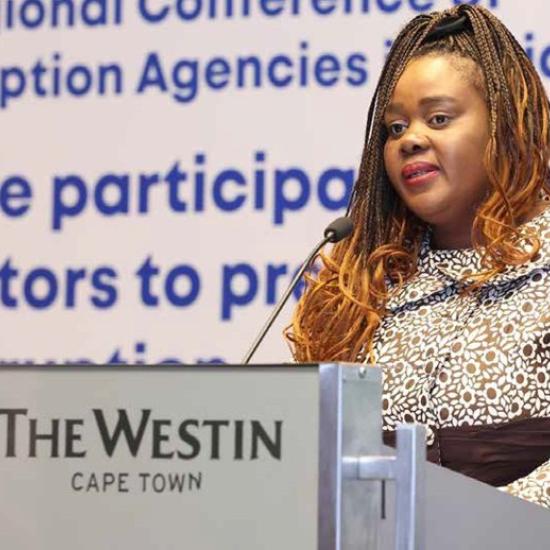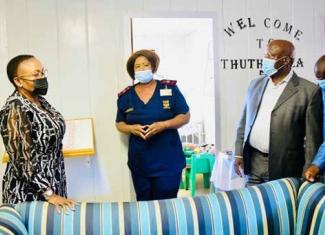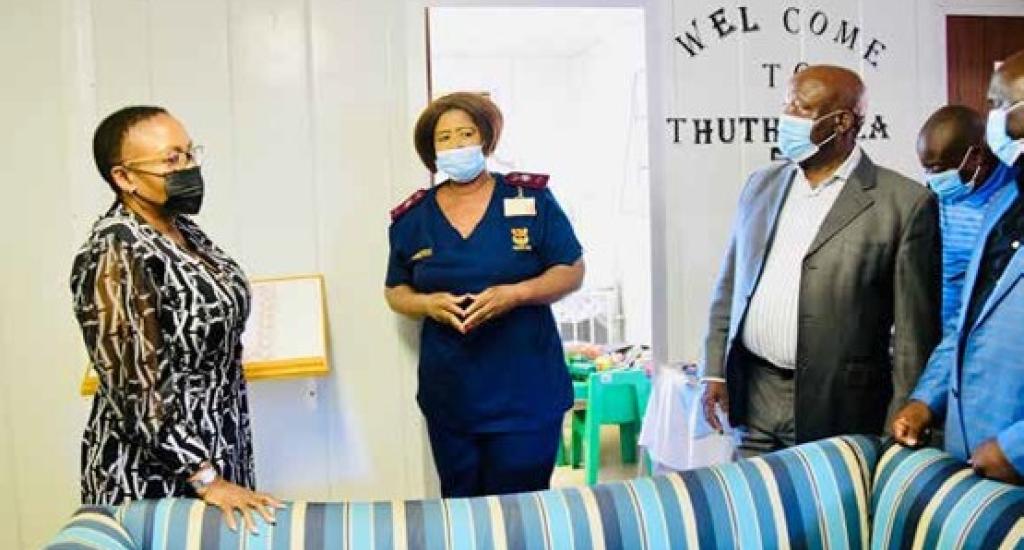Strengthening the justice system
to protect survivors of GBVF

Gender-Based Violence and Femicide (GBVF) remains one of the most harrowing human rights violations in our country. It robs women and children of their safety, dignity and freedom, while undermining our broader efforts to build a peaceful, equal and just society.
As we commemorate Women’s Month 2025, we are reminded that the struggle against GBVF is far from over.
We must strengthen our resolve to protect the most vulnerable and to ensure that every woman and girl in our country lives free from fear and harm.
GBVF a pandemic
President Cyril Ramaphosa has correctly described GBVF as a “second pandemic” in South Africa, a crisis with far-reaching consequences and destructive for our social fabric. This is not an exaggeration, but a powerful call to action.
Like any pandemic, GBVF demands a response marked by urgency, coordination and national solidarity.
As Minister of Justice and Constitutional Development, I reaffirm our unwavering commitment to building a justice system that delivers meaningful outcomes for survivors of GBVF.
Legal framework to tackle GBVF
South Africa has a robust legal framework to combat GBVF. Key pieces of legislation, such as the Criminal Law (Sexual Offences and Related Matters) Amendment Act of 2021, the Domestic Violence Act of 1998, and the Criminal and Related Matters Amendment Act of 2021, have been significantly strengthened in recent years.
These amendments have enhanced victim protection, tightened bail provisions, and introduced harsher penalties for perpetrators. The National Register for Sex Offenders is being expanded, with legislation under review to improve public access while balancing privacy and protection for vulnerable groups.
Rise in convictions
Convictions for sexual offences have risen steadily over the past three years. In 2022/23, there were approximately 1 426 convictions, with about 69% resulting in direct imprisonment.
This number rose to around 3 109 in 2023/24, with nearly 79% resulting in direct imprisonment, and further increased to approximately 3 697 in 2024/25, maintaining a similar imprisonment rate.
These figures reflect the tangible impact of improved legislation and intensified prosecution.
Our 66 Thuthuzela Care Centres (TCCs) have provided comprehensive support, including medical, psychological, and legal services, to over 44 000 survivors. These centres are the cornerstone of our survivor-centred approach, helping to reduce secondary victimisation and improve access to justice.
In collaboration with the SAPS and Forensic Science Laboratories, we have processed over 60 000 DNA samples, an essential tool in identifying and prosecuting serial offenders.
New sexual offences courts
To further improve access to justice, particularly in rural and underserviced areas, the Department of Justice and Constitutional Development has established 16 new sexual offences courts.
Furthermore, two new TCCs are being introduced: one in Rietvlei, KwaZulu-Natal, which is expected to open in November 2025, and another under development, with four potential sites currently under review.
These specialised courts are designed to deliver faster trials and trauma-sensitive services, including private testifying rooms and trained intermediaries, to better support survivors.
We have also introduced a policy requiring that protection orders be served by the clerk of the court on respondents within 24 hours of issuance, ensuring swift protection for those at immediate risk.
We recognise concerns about delays and uneven attention in the justice system and are working with key partners through the Justice, Crime Prevention and Security (JCPS) Cluster to improve coordination and accountability in tackling GBVF.
Improved coordination
A key intervention has been the implementation of the 90-Day Acceleration Programme, led by the National Joint Operational and Intelligence Structure (NATJOINTS), aimed at fast-tracking the execution of the National Strategic Plan on GBVF.
In response to the urgency and scale of the crisis, the Cluster has revitalised and reconstituted the Inter-Ministerial Committee (IMC) on GBVF as the central coordinating body to fast-track government interventions, resolve systemic challenges, and ensure measurable, tangible progress.
The rollout of the Integrated Deployment Plan in GBVF hotspots has improved service delivery at critical points, such as police stations, hospitals, TCCs and shelters.
One remarkable success story comes from Limpopo, where over 1 600 domestic violence cases were finalised in just 100 days, achieving an 86% reduction in the case backlog. This achievement, realised through the 100-Day Challenge model, is now being replicated in other provinces.
Furthermore, the development of the Integrated Reporting Repository (IRR) is enabling more accurate tracking of GBVF-related data, supporting evidence-based decision-making and accountability.
These coordinated interventions are bearing fruit: in high-profile convictions, in landmark judgments, and in community-based efforts that are making women and children safer.
Each conviction signifies justice served. Each timely protection order represents a life potentially saved. These outcomes are not just statistics, they are stories of courage, survival and hope. They are proof that a survivor-centred justice system can and does make a difference.
Collective moral duty
This Women’s Month, I call on every South African to take an active stand against GBVF. This is not the responsibility of the justice system alone, it is a collective moral duty. We must challenge harmful norms, support survivors, hold perpetrators accountable and foster a culture in which women and children are safe and free.
The Department of Justice and Constitutional Development I lead, remains fully committed to building a South Africa that is safe, just, and equal for every woman and girl.
Our work is firmly guided by the Constitution of the Republic of South Africa, 1996, which affirms the State's duty to protect women and children from GBVF and abuse.
Protecting the vulnerable
Rooted in the values of dignity, equality and freedom, the Constitution guarantees equal protection under the law, prohibits gender discrimination, and places an obligation on the State to act to promote equality, particularly for those disadvantaged by unfair discrimination.
We will continue to advocate for stronger laws, more effective implementation and universal access to justice. Let us ensure that justice is not only done, but seen, felt and experienced by those who need it most. Let us honour those we have lost by protecting those still with us.




